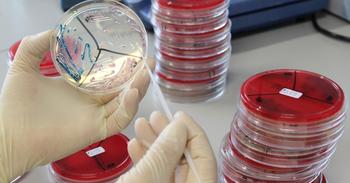Infectious Disease Diagnostics and Molecular Epidemiology (IME)
- BMBF
The center of the research group "Infectious Disease Diagnostics and Molecular Epidemiology” is a diagnostic lab that offers high-quality clinical microbial service for the clinics and institutes of the department of veterinary medicine at the Freie Universität Berlin and independent veterinarians and pathologists. The veterinary academic staff is specialized on clinical microbiology and handles samples from almost all animal species applying internationally accepted standard methods for the identification of bacteria and antimicrobial susceptibility testing as well as innovative methods (e.g. MALDI-TOF). We offer a broad range of PCR tests for bacterial identification and characterization together with DNA fingerprinting methods for outbreak investigation. Thereby we mainly focus on bacterial and fungal infections of companion animals.
The diagnostic lab is an important interface that gives impetus to university teaching and research. Moreover it is a source for interesting bacterial and fungal isolates. New emerging pathogens and bacterial resistance pattern can be detected and characterized at an early stage.
The consultant laboratory for nosocomial infections in veterinary medicine, which offers comprehensive consultation services on infection control and prudent use of antibiotics as well as the main research focus of this group: “zoonotic and multidrug-resistant pathogens” are direct spin-offs of the diagnostic lab.
Various sub-projects deal with the epidemiology, population structure, evolution and host specificity of multidrug-resistant bacteria such as methicillin-resistant staphylococci and Clostridium difficile applying both standard molecular typing methods for pathogens (e.g. pulsed-field gel electrophoresis, multilocus sequence typing, microarray hybridization, spa-typing) and whole genome sequencing using next generation technology plus expression studies in serum. Besides we develop measures against the increasing spread of nosocomial pathogens within companion animal clinical settings.


